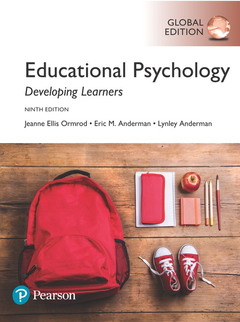Description
Educational Psychology: Developing Learners, Global Edition (9th Ed.)
Authors: Ormrod Jeanne, Anderman Eric, Anderman Lynley
Language: English
Subject for Educational Psychology: Developing Learners, Global Edition:
87.98 €
In Print (Delivery period: 14 days).
Add to cart776 p. · 21.8x27.1 cm · Paperback
Description
/li>Contents
/li>Comment
/li>
Designed for both undergraduate and masters-level introduction to educational psychology courses.
Helps students understand their own learning and apply the core concepts and principles of educational psychology.
Educational Psychology: Developing Learners is known for its exceptionally clear and engaging writing, its in-depth focus on learning, and its extensive concrete applications. The text's unique approach helps students understand concepts by examining their own learning and then showing them how to apply these concepts as teachers. The text moves seamlessly between theory and applications, features the most extensive and integrated coverage of diversity, contexts of learning, and neuropsychology and brain development. It also includes innumerable concrete examples and artifacts to help readers connect educational psychology to real children and classrooms.
- Chapter 1 Teaching and Educational Psychology
- Part I Development and Diversity
- Chapter 2 Cognitive and Linguistic Development
- Chapter 3 Personal and Social Development
- Chapter 4 Group Differences
- Chapter 5 Individual Differences and Special Educational Needs
- Part II Learning and Motivation
- Chapter 6 Learning, Cognition, and Memory
- Chapter 7 Complex Cognitive Processes
- Chapter 8 Learning and Cognition in Context
- Chapter 9 Behaviorist Views of Learning
- Chapter 10 Social Cognitive Views of Learning
- Chapter 11 Motivation and Affect
- Part III Classroom Strategies
- Chapter 12 Instructional Strategies
- Chapter 13 Creating a Productive Learning Environment
- Chapter 14 Classroom Assessment Strategies
- Chapter 15 Summarizing Students’ Achievements and Abilities
- Appendices
- Appendix A: Describing Associations with Correlation Coefficients A-1
- Appendix B: Determining Reliability and Predictive Validity B-1
- Appendix C: Matching Book and MyEducationLab Content to the Praxis® Principles of Learning and Teaching Tests C-1
This title is a Pearson Global Edition. The Editorial team at Pearson has worked closely with educators around the world to include content which is especially relevant to students outside the United States.
- Focuses on core concepts and principles. Rather than superficially explore every aspect of educational psychology, this book zeroes in on fundamental concepts and principles that have broad applicability to classroom practice. Core principles are clearly identified in sections labeled “Basic Principles” or “Basic Assumptions” and then often summarized in Principles/Assumptions tables. Each table includes educational implications and concrete examples.
- Helps learners see and understand their own learning. A central goal of this book has always been to help readers discover more about themselves as thinkers and learners. To do this, Experiencing Firsthand exercises are included throughout the book. All of these exercises are designed to help readers observe principles of educational psychology in themselves. See the following pages for some examples.
- Helps learners see and understand children’s and adolescents’ learning and behavior. Each chapter begins with a Case Study that situates chapter content in a real-life scenario. The text also makes frequent use of videos examples and of real artifacts from children’s journals and school assignments to illustrate concepts and principles in action.
- Uniquely focuses on children’s development in every chapter. For example, most chapters include one or more Developmental Trends tables that summarize age-typical characteristics at four grade levels (K-2, 3-5, 6-8, and 9-12). These tables also present concrete examples of characteristics and offer developmentally appropriate classroom strategies for each developmental level.
- Always applies core concep




